|
Creating herbal oils is a simple and enjoyable process. Herbal Infused Oils can then be made into salve, lip balm, cream, used for culinary purposes, or simply used as a massage oil. There are several ways to make herbal infused oil: 1- Solar infusion Method, 2-Heat Infusion method, 3- Alcohol Intermediary Method. Personally I have mostly used the simple solar infused method, but I recently made comfrey oil using the alcohol intermediary method and I must say that I am very impressed. The oil is much more potent than any I have ever made, and it was ready within 24 hours! But each way has it's own strengths, so read on to learn about all three methods! First though, let's talk about choosing the herbs and the oil! Or if you already know which herbs you want to infuse, scroll down to get directly to the instructions! Choosing your herbs and oil
Choosing an Oil Everyone has their favorite oil to use in herbal oil infusions. I keep it simple and most often use organic olive oil since it is affordable and readily available. Plus, one of my favorite herbalists, Rosemary Gladstar recommends it! Other favorites oils for herbal infusions include sweet almond oil, sunflower oil, grapeseed oil, and coconut oil. Herb to Oil Ideal Ratios Dried Herbs 1:5-1:8 Fresh Herbs 1:2-1:4 (Weight of herb: volume of oil) ...and there is always the folk method: fill a jar halfway with your herb of choice, and add enough oil to cover For best results, hand chop or use a blender, food processor, or coffee grinder to grind your herb before mixing it with the oil. This exposes more surface area of the herb to the oil which creates a more potent infusion. You can grind the herb into smaller chunks, or all the way to powder. Powdered herbs take more time to strain from the oil, so I prefer to grind the herbs into small bits. But the choice is yours so find your own preference by experimenting! Solar Infusions4I have heard this method called the 'folk' method . . .and so it is. . .simple, straightforward, and easy! You can use either fresh or dried herbs for this method, but if using fresh herbs care must be taken to ensure that the oil doesn't go rancid due to moisture from the plant material. Let the fresh herbs wilt to ensure the moisture is gone, and always be sure the jar you are using is clean and completely dry. It's also incredibly important to make sure the herbs always remain completely submerged in the oil. The process is simple: chop or grind your herbs, place them in a jar, and fill with oil. Place a lid on the jar, give it a good shake, and place it in a warm sunny location where you will see it often. Over the next 4-6 weeks, shake the jar and then be sure that after the herbs settle they are still submerged. Strain and keep in a cool, dark location. Heat InfusionsUsing heat to create infused oil produces a finished product in a short amount of time. There are many variations of this method, but the general idea is simple: heat the oil and herbs slowly and at a low temperature (120-140 Fahrenheit) to avoid burning the herbs. You can either use a crock pot, double boiler, or yoghurt maker. If using a double boiler, simply mix the herb and oil into the top pot and simmer the water underneath for 30 minutes to an hour. For the crock pot method, place your chopped/ground herb of choice in a clean, dry jar, add your oil (being sure the herb is submerged completely) and place this in your crock pot. Add water to your crock pot so that water reaches to just below the lid of the jar, and set to low. l keep the lid off the crock pot to be sure the oil/herbs don't get too hot. Let the herb and oil heat all day or overnight to create a strong and potent oil. Strain and rebottle, storing in a cool and dark location. Alcohol Intermediary InfusionsThis method creates a very potent oil that has a longer shelf life than oils made with the above methods. This is due to the addition to a small amount of alcohol to the plant material which prevents mold and microbial growth. The process is still pretty simple, but contains one additional step in the beginning. Use only dried herbs for this method. Grind your herbs into a course powder. For each ounce of herb, add approximately 1/2 ounce of whole grain alcohol (everclear or vodka) to the ground herbs and mix, just enough to dampen. If using the folk measuring method, fill your jar about 1/4 full of ground herb and add just enough alcohol to slightly dampen. Cover you jar and let it sit for 24 hours. Next fill the jar with your oil of choice and mix well, making sure that the herbs are submerged in the oil. Lastly, use one of the heat infusion methods above. Strain and rebottle. ReferencesOpening Our Wild Hearts to Healing Herbs Gail Faith Edwards
Materia Medica Monthly, Sajah Popham (online Program) www.evolutionaryherbalism.com Wild Remedies Rosalee De la Foret & Emily Han Rosemary Gladstar's Family Herbal Rosemary Gladstar Making Plant Medicine Richo Cech
1 Comment
|
AuthorMusings by |
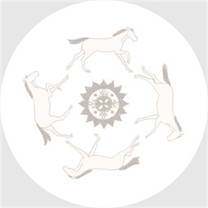
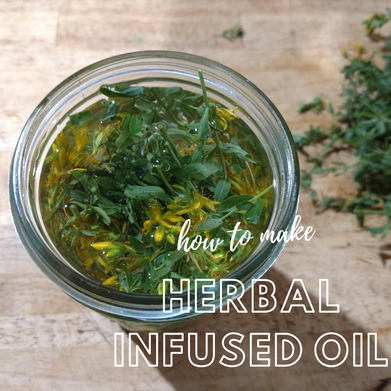
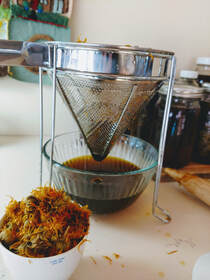
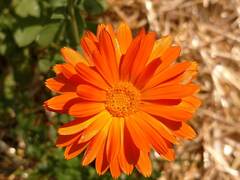
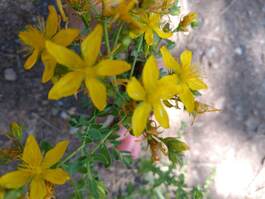
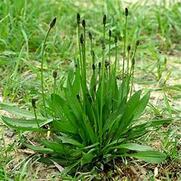
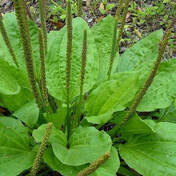
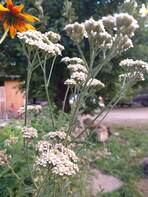
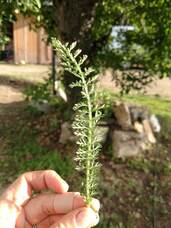
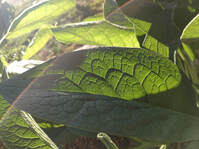
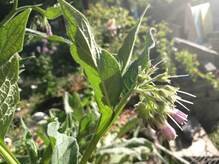
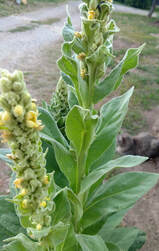
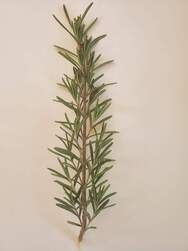
 RSS Feed
RSS Feed
